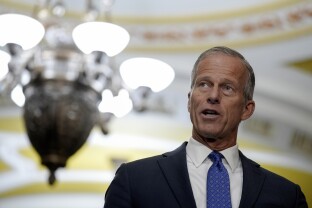Donald Trump’s long-standing pledge to implement sweeping tariffs against Mexico, Canada and China is now moving into effect. For Trump, it’s about much more than economic policy.
“Tariffs are not just about protecting American jobs,” Trump said in his address. “They’re about protecting the soul of our country. Tariffs are about making America rich again and making America great again.”
But for Republicans in Congress, many of whom hail from districts that would be heavily impacted by tariffs, Trump’s new push is concerning.
Trump announced on Thursday he will give Mexico and Canada a one-month pause on all tariffs on goods under the USMCA agreement, in addition to the pause on tariffs on the auto industry. Those tariffs are set to go into effect on April 2.
Of course, if Republicans speak out about the new assessments, they risk angering Trump and losing their ability to influence the president.
So, for now, despite decades of the GOP pushing for free trade, Republicans are basically falling in line. Some are even praising Trump.
Speaking to reporters Tuesday, House Speaker Mike Johnson said he “came up as a Reagan Republican” and was downright effusive about the president’s trade policy in the same breath.
“We believe in free markets and free trade, and the president was really ahead of his time,” Johnson said.
He pointed to Trump’s 2016 campaign message of “free trade, but fair trade.”
“His idea of reciprocal tariff policy actually really comports with common sense,” Johnson said.
In the Senate, Majority Leader John Thune struck a more tentative tone, but he still suggested that he supported Trump’s moves — for now.
“I’m hoping they’re a means to an end and not the end itself. I think they’re hopefully temporary, designed to achieve a specific result,” Thune said Tuesday.
He added that he comes from “an agricultural state,” and therefore sees tariffs “through a different lens.” But he refrained from directly criticizing tariffs that have already sent stock markets tumbling and could lead to higher prices on thousands of goods, halt global supply chains and dramatically disrupt the automotive industry and U.S. agriculture.
Thune has long been wary of tariffs and their impact on South Dakota. When Trump in January first proposed the tariffs, Thune spoke out against “across-the-board, universal reform tariffs,” which is exactly what Trump has now implemented.
Other Republicans from agricultural states struck similar tones: cautious, but willing to give the president latitude. There’s concern about the effects on farmers in their districts, they said, but it’s only a problem if the tariffs continue with no end.
Asked if he was concerned about the tariffs, Rep. Mark Messmer, a freshman representing a highly agricultural area of southwestern Indiana, had two words: “Everybody is.”
Trump acknowledged Tuesday night that there would be “a little bit of an adjustment period.”
“There’ll be a little disturbance, but we’re OK with that. It won’t be much,” Trump said.
Trump is testing the limits for tariff-wary Republicans: how long is too long, how much is too much?
“There’s got to be a game plan for it,” GOP Sen. Thom Tillis told NOTUS.
“President Trump is willing to go to the brink,” Tillis said. “I’m not concerned now, but if we don’t tailor it, I know how the playbook plays out.”
Senators are already lobbying the Trump administration for carve-outs and exceptions to ensure certain industries aren’t detrimentally impacted. Iowa Sen. Chuck Grassley publicly pleaded with Trump to exempt potash, a key ingredient in fertilizer that mainly comes from Canada.
When Republicans in the Iowa delegation met Tuesday for their monthly breakfast, tariffs were a major part of their conversation. It was a coincidence that their meeting took place on the same day the tariffs that would significantly affect Iowa farming went into effect, they said.
“It was fortuitous,” Iowa Rep. Zach Nunn said of the meeting. He said the delegation is on the same page: tariffs can be beneficial, as long as they don’t impact production in Iowa.
“This is an area where the administration is aware. We’ve got a door open to them, and they’re receiving feedback on that,” Nunn said of the potential potash exemption.
Fellow Iowa Republican Rep. Ashley Hinson told NOTUS she’s “always concerned about tariffs.”
Still, she said she supports Trump’s plan and added that tariffs should be “a tool in the toolbox” to force China to negotiate.
“President Trump’s always playing chess, not checkers. He’s thinking of ways to get people to the table, using these tariffs as a tool to do that,” Hinson said.
“I’m going to remain optimistic until I have a reason not to be,” she said.
Republicans are in almost unanimous agreement that short-term tariffs are fine. What will divide the party, however, is what to do if short-term tariffs become long-term — and how long it should be before Trump scales them back.
“The shorter the better,” Washington Rep. Dan Newhouse told NOTUS.
“If they’re extended, if they go into a long-term kind of trade war that we could be seeing, that could have a lot of negative impacts to the agricultural industry in my district,” Newhouse said.
“It can’t all be consumed domestically,” he added. “There’s only so many apples that people in the United States are going to eat.”
—
Katherine Swartz is a NOTUS reporter and an Allbritton Journalism Institute fellow.
Sign in
Log into your free account with your email. Don’t have one?
Check your email for a one-time code.
We sent a 4-digit code to . Enter the pin to confirm your account.
New code will be available in 1:00
Let’s try this again.
We encountered an error with the passcode sent to . Please reenter your email.


